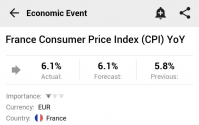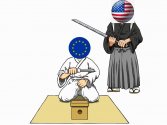Freedom is priceless, so this means nothing. It is its own energy source which will be used for warming Great Britain's homes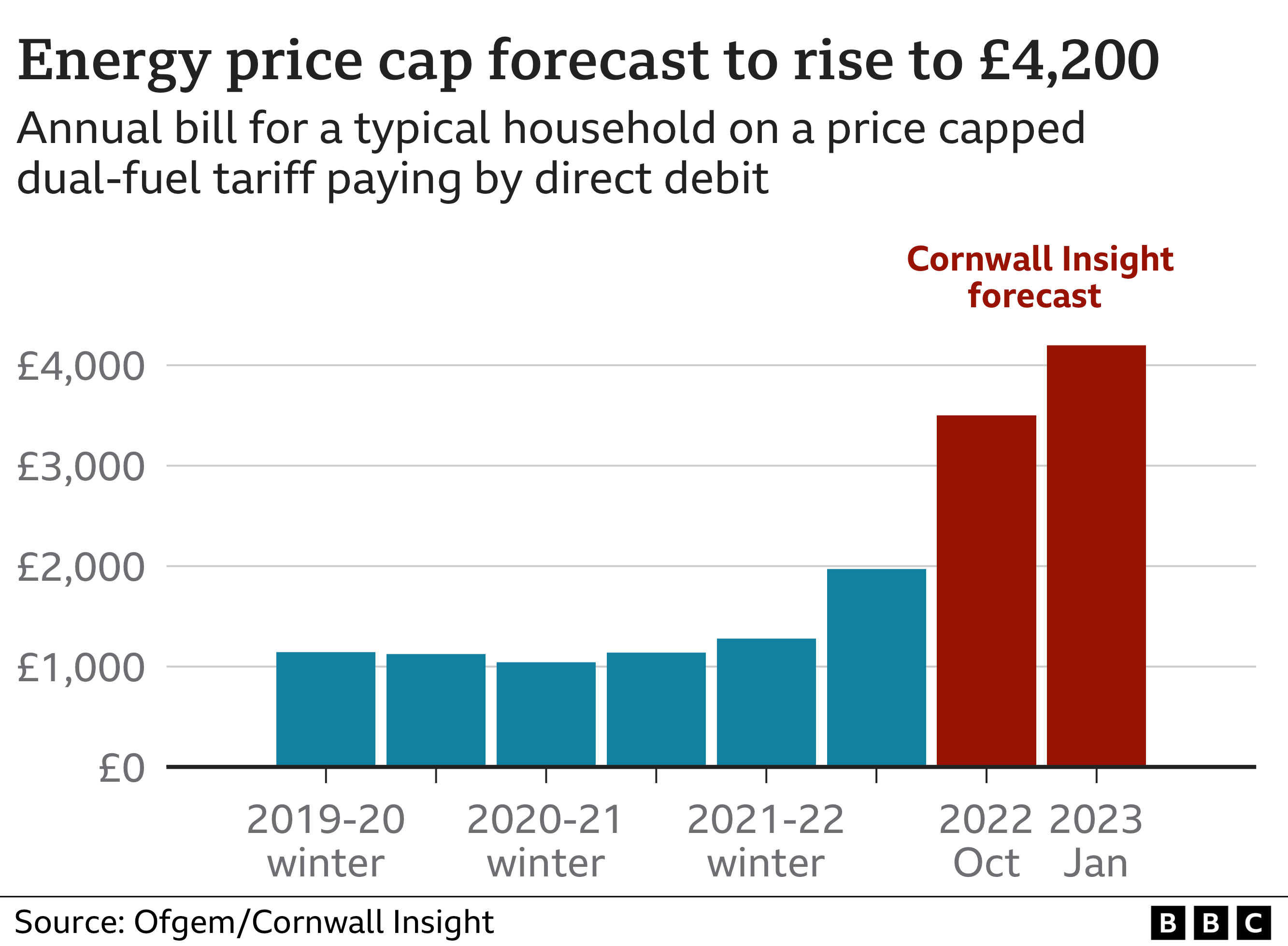
This is totally fine and I don't see any possible problems here...
You are using an out of date browser. It may not display this or other websites correctly.
You should upgrade or use an alternative browser.
You should upgrade or use an alternative browser.
European Economics Thread
- Thread starter PiSigma
- Start date
Freedom is priceless, so this means nothing. It is its own energy source which will be used for warming Great Britain's homes

She has a very punchable face.
Firmly holding the Germans by the throat and balls...
Why Germany won’t get tough on Beijing — even if it invades Taiwan
The German economy is even more dependent on China than it is on Russia.
Olaf Scholz (while Mayor of Hamburg) meets China's Xi Jinping | Patrik Stollarz/AFP via Getty Images
By Matthew Karnitschnig August 12, 2022 4:00 am
BERLIN — Germany’s Wagnerian foreign policy spectacle is moving east.
Spoiler alert: It’s even worse than the original.
For months, Berlin has frustrated (read enraged) many allies with its one step forward, two steps back approach to confronting Russia over Ukraine. Yet that tortured episode is looking like little more than an overture to what’s brewing in Asia, as tensions over Taiwan force Berlin to weigh how it would respond if Beijing tries to seize the island nation, which China considers a breakaway region.
If that happens, the U.S. and other Western allies would push for tough sanctions against China. Germany is unlikely to be among them, a course that could protect its export-driven economy, but damage both its own and Europe’s international credibility.
Asked Thursday whether Germany could afford to support sanctions in the event of a Chinese invasion, Chancellor Olaf Scholz dodged the question, while reprimanding German industry for ignoring the maxim “to not put all your eggs in one basket.”
“The question of our country’s dependence in crucial areas concerning supply chains, raw materials and other things is a necessary element of our national security strategy, which we’re working on at the moment,” he added, without mentioning China by name.
Others have been more direct. German industry’s reliance on exports has “created a dependency that leaves us helpless,” Norbert Röttgen, a prominent center-right MP, told German television earlier this week.
Could Germany back sanctions against China?
“At the moment, not really,” said Röttgen, a former minister and longtime chairman of the German parliament’s foreign policy committee.
While the debate is in many respects a redux of Germany’s manic handwringing over whether and how to confront Russia over Ukraine, this time even more is at stake.
Germany’s big concern over antagonizing Moscow was losing access to cheap energy. With Beijing, it’s about losing the foundation of its economic prosperity. In recent years, China has overtaken the U.S. to become Germany’s biggest trading partner, accounting for nearly 10 percent of the country’s €2.6 trillion in foreign trade last year. What’s more, China, which has propelled the German economy for decades, remains a key growth driver.
That’s why reducing German industry’s reliance on the country is easier said than done.
A Chinese military jet flies over Pingtan island, one of mainland China’s closest point from Taiwan | Hector Retamal/AFP via Getty Images)
“The degree to which our prosperity is funded by China is extremely underestimated in this country,” Volkswagen Chief Executive Herbert Diess said in a recent interview. “Germany would look a lot different if we were to decouple.”
Indeed, no German industry is more dependent on China than Diess’ own. Every third car produced by German carmakers is sold in China. German carmakers also operate a substantial network of factories in China itself, producing 4.3 million cars there in 2021 alone.
“The German car industry, like the rest of the world, is watching the tensions between China and Taiwan with concern,” said a spokeswoman for the industry’s lobbying arm, known as the VDA.
“Panic” might be a better word.
VW’s Diess, who is due to step down as head of Europe’s largest automaker later this month, says that China is “indispensable” for the company’s future.
The picture is similar across other key German export sectors, from chemicals to machinery. About 1.1 million German jobs, or 2.4 percent of the total, directly rely on Chinese consumption, according to a June study by the Cologne-based German Economic Institute.
Though Germany and the rest of the EU are crucial markets for China as well, the study notes that the Chinese are reducing their dependence on the region, while European exposure to China is increasing.
In an urgent plea, study author Jürgen Matthes said it was “high time” for Europe and Germany to reverse course and reduce their economic reliance on China.
“It’s not about decoupling, but rather limiting dependencies, especially through more diversification,” he wrote.
Yet just as it took decades for German industry to establish itself in China, pulling back won’t happen overnight — especially considering that few regions around the world offer the kind of reliable growth that China does.
Hence Germany’s quandary.
“In the event of a Chinese invasion of Taiwan followed by massive Western sanctions, export and revenue declines as well the suspension of deliveries out of China would lead to considerable economic losses in the EU and especially in Germany,” Matthes concluded.
Every third car produced by German carmakers is sold in China | Stringer/Getty Images via AsiaPac
Given that outlook, German support for substantial Western sanctions is doubtful. Though Berlin backed tough measures on Moscow after the full-scale invasion of Ukraine in February, the potential economic fallout for Germany was limited and largely for show.
Even as Scholz suspended the controversial Nord Stream 2 gas pipeline project with Russia, for example, he also tried to ringfence Germany’s core energy interests by rejecting calls for an all-out gas embargo.
That strategy didn’t pan out as he’d hoped, but only because the Russians themselves reduced the flow of natural gas to Europe. The ongoing gas shortage in Germany, which threatens to hobble key industrial sectors, will inevitably influence how the government responds to a potential Chinese invasion of Taiwan. With inflation high and energy prices showing no signs of falling, Germany can ill afford another hit to its flagging economy.
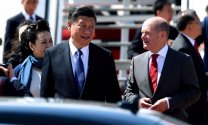
Why Germany won’t get tough on Beijing — even if it invades Taiwan
The German economy is even more dependent on China than it is on Russia.
Olaf Scholz (while Mayor of Hamburg) meets China's Xi Jinping | Patrik Stollarz/AFP via Getty Images
By Matthew Karnitschnig August 12, 2022 4:00 am
BERLIN — Germany’s Wagnerian foreign policy spectacle is moving east.
Spoiler alert: It’s even worse than the original.
For months, Berlin has frustrated (read enraged) many allies with its one step forward, two steps back approach to confronting Russia over Ukraine. Yet that tortured episode is looking like little more than an overture to what’s brewing in Asia, as tensions over Taiwan force Berlin to weigh how it would respond if Beijing tries to seize the island nation, which China considers a breakaway region.
If that happens, the U.S. and other Western allies would push for tough sanctions against China. Germany is unlikely to be among them, a course that could protect its export-driven economy, but damage both its own and Europe’s international credibility.
Asked Thursday whether Germany could afford to support sanctions in the event of a Chinese invasion, Chancellor Olaf Scholz dodged the question, while reprimanding German industry for ignoring the maxim “to not put all your eggs in one basket.”
“The question of our country’s dependence in crucial areas concerning supply chains, raw materials and other things is a necessary element of our national security strategy, which we’re working on at the moment,” he added, without mentioning China by name.
Others have been more direct. German industry’s reliance on exports has “created a dependency that leaves us helpless,” Norbert Röttgen, a prominent center-right MP, told German television earlier this week.
Could Germany back sanctions against China?
“At the moment, not really,” said Röttgen, a former minister and longtime chairman of the German parliament’s foreign policy committee.
While the debate is in many respects a redux of Germany’s manic handwringing over whether and how to confront Russia over Ukraine, this time even more is at stake.
Germany’s big concern over antagonizing Moscow was losing access to cheap energy. With Beijing, it’s about losing the foundation of its economic prosperity. In recent years, China has overtaken the U.S. to become Germany’s biggest trading partner, accounting for nearly 10 percent of the country’s €2.6 trillion in foreign trade last year. What’s more, China, which has propelled the German economy for decades, remains a key growth driver.
That’s why reducing German industry’s reliance on the country is easier said than done.
A Chinese military jet flies over Pingtan island, one of mainland China’s closest point from Taiwan | Hector Retamal/AFP via Getty Images)
“The degree to which our prosperity is funded by China is extremely underestimated in this country,” Volkswagen Chief Executive Herbert Diess said in a recent interview. “Germany would look a lot different if we were to decouple.”
Indeed, no German industry is more dependent on China than Diess’ own. Every third car produced by German carmakers is sold in China. German carmakers also operate a substantial network of factories in China itself, producing 4.3 million cars there in 2021 alone.
“The German car industry, like the rest of the world, is watching the tensions between China and Taiwan with concern,” said a spokeswoman for the industry’s lobbying arm, known as the VDA.
“Panic” might be a better word.
VW’s Diess, who is due to step down as head of Europe’s largest automaker later this month, says that China is “indispensable” for the company’s future.
The picture is similar across other key German export sectors, from chemicals to machinery. About 1.1 million German jobs, or 2.4 percent of the total, directly rely on Chinese consumption, according to a June study by the Cologne-based German Economic Institute.
Though Germany and the rest of the EU are crucial markets for China as well, the study notes that the Chinese are reducing their dependence on the region, while European exposure to China is increasing.
In an urgent plea, study author Jürgen Matthes said it was “high time” for Europe and Germany to reverse course and reduce their economic reliance on China.
“It’s not about decoupling, but rather limiting dependencies, especially through more diversification,” he wrote.
Yet just as it took decades for German industry to establish itself in China, pulling back won’t happen overnight — especially considering that few regions around the world offer the kind of reliable growth that China does.
Hence Germany’s quandary.
“In the event of a Chinese invasion of Taiwan followed by massive Western sanctions, export and revenue declines as well the suspension of deliveries out of China would lead to considerable economic losses in the EU and especially in Germany,” Matthes concluded.
Every third car produced by German carmakers is sold in China | Stringer/Getty Images via AsiaPac
Given that outlook, German support for substantial Western sanctions is doubtful. Though Berlin backed tough measures on Moscow after the full-scale invasion of Ukraine in February, the potential economic fallout for Germany was limited and largely for show.
Even as Scholz suspended the controversial Nord Stream 2 gas pipeline project with Russia, for example, he also tried to ringfence Germany’s core energy interests by rejecting calls for an all-out gas embargo.
That strategy didn’t pan out as he’d hoped, but only because the Russians themselves reduced the flow of natural gas to Europe. The ongoing gas shortage in Germany, which threatens to hobble key industrial sectors, will inevitably influence how the government responds to a potential Chinese invasion of Taiwan. With inflation high and energy prices showing no signs of falling, Germany can ill afford another hit to its flagging economy.

As Trump would say, grab them by the ......Firmly holding the Germans by the throat and balls...
Why Germany won’t get tough on Beijing — even if it invades Taiwan
The German economy is even more dependent on China than it is on Russia.
Olaf Scholz (while Mayor of Hamburg) meets China's Xi Jinping | Patrik Stollarz/AFP via Getty Images
By Matthew Karnitschnig August 12, 2022 4:00 am
BERLIN — Germany’s Wagnerian foreign policy spectacle is moving east.
Spoiler alert: It’s even worse than the original.
For months, Berlin has frustrated (read enraged) many allies with its one step forward, two steps back approach to confronting Russia over Ukraine. Yet that tortured episode is looking like little more than an overture to what’s brewing in Asia, as tensions over Taiwan force Berlin to weigh how it would respond if Beijing tries to seize the island nation, which China considers a breakaway region.
If that happens, the U.S. and other Western allies would push for tough sanctions against China. Germany is unlikely to be among them, a course that could protect its export-driven economy, but damage both its own and Europe’s international credibility.
Asked Thursday whether Germany could afford to support sanctions in the event of a Chinese invasion, Chancellor Olaf Scholz dodged the question, while reprimanding German industry for ignoring the maxim “to not put all your eggs in one basket.”
“The question of our country’s dependence in crucial areas concerning supply chains, raw materials and other things is a necessary element of our national security strategy, which we’re working on at the moment,” he added, without mentioning China by name.
Others have been more direct. German industry’s reliance on exports has “created a dependency that leaves us helpless,” Norbert Röttgen, a prominent center-right MP, told German television earlier this week.
Could Germany back sanctions against China?
“At the moment, not really,” said Röttgen, a former minister and longtime chairman of the German parliament’s foreign policy committee.
While the debate is in many respects a redux of Germany’s manic handwringing over whether and how to confront Russia over Ukraine, this time even more is at stake.
Germany’s big concern over antagonizing Moscow was losing access to cheap energy. With Beijing, it’s about losing the foundation of its economic prosperity. In recent years, China has overtaken the U.S. to become Germany’s biggest trading partner, accounting for nearly 10 percent of the country’s €2.6 trillion in foreign trade last year. What’s more, China, which has propelled the German economy for decades, remains a key growth driver.
That’s why reducing German industry’s reliance on the country is easier said than done.
A Chinese military jet flies over Pingtan island, one of mainland China’s closest point from Taiwan | Hector Retamal/AFP via Getty Images)
“The degree to which our prosperity is funded by China is extremely underestimated in this country,” Volkswagen Chief Executive Herbert Diess said in a recent interview. “Germany would look a lot different if we were to decouple.”
Indeed, no German industry is more dependent on China than Diess’ own. Every third car produced by German carmakers is sold in China. German carmakers also operate a substantial network of factories in China itself, producing 4.3 million cars there in 2021 alone.
“The German car industry, like the rest of the world, is watching the tensions between China and Taiwan with concern,” said a spokeswoman for the industry’s lobbying arm, known as the VDA.
“Panic” might be a better word.
VW’s Diess, who is due to step down as head of Europe’s largest automaker later this month, says that China is “indispensable” for the company’s future.
The picture is similar across other key German export sectors, from chemicals to machinery. About 1.1 million German jobs, or 2.4 percent of the total, directly rely on Chinese consumption, according to a June study by the Cologne-based German Economic Institute.
Though Germany and the rest of the EU are crucial markets for China as well, the study notes that the Chinese are reducing their dependence on the region, while European exposure to China is increasing.
In an urgent plea, study author Jürgen Matthes said it was “high time” for Europe and Germany to reverse course and reduce their economic reliance on China.
“It’s not about decoupling, but rather limiting dependencies, especially through more diversification,” he wrote.
Yet just as it took decades for German industry to establish itself in China, pulling back won’t happen overnight — especially considering that few regions around the world offer the kind of reliable growth that China does.
Hence Germany’s quandary.
“In the event of a Chinese invasion of Taiwan followed by massive Western sanctions, export and revenue declines as well the suspension of deliveries out of China would lead to considerable economic losses in the EU and especially in Germany,” Matthes concluded.
Every third car produced by German carmakers is sold in China | Stringer/Getty Images via AsiaPac
Given that outlook, German support for substantial Western sanctions is doubtful. Though Berlin backed tough measures on Moscow after the full-scale invasion of Ukraine in February, the potential economic fallout for Germany was limited and largely for show.
Even as Scholz suspended the controversial Nord Stream 2 gas pipeline project with Russia, for example, he also tried to ringfence Germany’s core energy interests by rejecting calls for an all-out gas embargo.
That strategy didn’t pan out as he’d hoped, but only because the Russians themselves reduced the flow of natural gas to Europe. The ongoing gas shortage in Germany, which threatens to hobble key industrial sectors, will inevitably influence how the government responds to a potential Chinese invasion of Taiwan. With inflation high and energy prices showing no signs of falling, Germany can ill afford another hit to its flagging economy.
View attachment 95397
Firmly holding the Germans by the throat and balls...
Why Germany won’t get tough on Beijing — even if it invades Taiwan
The German economy is even more dependent on China than it is on Russia.
Olaf Scholz (while Mayor of Hamburg) meets China's Xi Jinping | Patrik Stollarz/AFP via Getty Images
By Matthew Karnitschnig August 12, 2022 4:00 am
BERLIN — Germany’s Wagnerian foreign policy spectacle is moving east.
Spoiler alert: It’s even worse than the original.
For months, Berlin has frustrated (read enraged) many allies with its one step forward, two steps back approach to confronting Russia over Ukraine. Yet that tortured episode is looking like little more than an overture to what’s brewing in Asia, as tensions over Taiwan force Berlin to weigh how it would respond if Beijing tries to seize the island nation, which China considers a breakaway region.
If that happens, the U.S. and other Western allies would push for tough sanctions against China. Germany is unlikely to be among them, a course that could protect its export-driven economy, but damage both its own and Europe’s international credibility.
Asked Thursday whether Germany could afford to support sanctions in the event of a Chinese invasion, Chancellor Olaf Scholz dodged the question, while reprimanding German industry for ignoring the maxim “to not put all your eggs in one basket.”
“The question of our country’s dependence in crucial areas concerning supply chains, raw materials and other things is a necessary element of our national security strategy, which we’re working on at the moment,” he added, without mentioning China by name.
Others have been more direct. German industry’s reliance on exports has “created a dependency that leaves us helpless,” Norbert Röttgen, a prominent center-right MP, told German television earlier this week.
Could Germany back sanctions against China?
“At the moment, not really,” said Röttgen, a former minister and longtime chairman of the German parliament’s foreign policy committee.
While the debate is in many respects a redux of Germany’s manic handwringing over whether and how to confront Russia over Ukraine, this time even more is at stake.
Germany’s big concern over antagonizing Moscow was losing access to cheap energy. With Beijing, it’s about losing the foundation of its economic prosperity. In recent years, China has overtaken the U.S. to become Germany’s biggest trading partner, accounting for nearly 10 percent of the country’s €2.6 trillion in foreign trade last year. What’s more, China, which has propelled the German economy for decades, remains a key growth driver.
That’s why reducing German industry’s reliance on the country is easier said than done.
A Chinese military jet flies over Pingtan island, one of mainland China’s closest point from Taiwan | Hector Retamal/AFP via Getty Images)
“The degree to which our prosperity is funded by China is extremely underestimated in this country,” Volkswagen Chief Executive Herbert Diess said in a recent interview. “Germany would look a lot different if we were to decouple.”
Indeed, no German industry is more dependent on China than Diess’ own. Every third car produced by German carmakers is sold in China. German carmakers also operate a substantial network of factories in China itself, producing 4.3 million cars there in 2021 alone.
“The German car industry, like the rest of the world, is watching the tensions between China and Taiwan with concern,” said a spokeswoman for the industry’s lobbying arm, known as the VDA.
“Panic” might be a better word.
VW’s Diess, who is due to step down as head of Europe’s largest automaker later this month, says that China is “indispensable” for the company’s future.
The picture is similar across other key German export sectors, from chemicals to machinery. About 1.1 million German jobs, or 2.4 percent of the total, directly rely on Chinese consumption, according to a June study by the Cologne-based German Economic Institute.
Though Germany and the rest of the EU are crucial markets for China as well, the study notes that the Chinese are reducing their dependence on the region, while European exposure to China is increasing.
In an urgent plea, study author Jürgen Matthes said it was “high time” for Europe and Germany to reverse course and reduce their economic reliance on China.
“It’s not about decoupling, but rather limiting dependencies, especially through more diversification,” he wrote.
Yet just as it took decades for German industry to establish itself in China, pulling back won’t happen overnight — especially considering that few regions around the world offer the kind of reliable growth that China does.
Hence Germany’s quandary.
“In the event of a Chinese invasion of Taiwan followed by massive Western sanctions, export and revenue declines as well the suspension of deliveries out of China would lead to considerable economic losses in the EU and especially in Germany,” Matthes concluded.
Every third car produced by German carmakers is sold in China | Stringer/Getty Images via AsiaPac
Given that outlook, German support for substantial Western sanctions is doubtful. Though Berlin backed tough measures on Moscow after the full-scale invasion of Ukraine in February, the potential economic fallout for Germany was limited and largely for show.
Even as Scholz suspended the controversial Nord Stream 2 gas pipeline project with Russia, for example, he also tried to ringfence Germany’s core energy interests by rejecting calls for an all-out gas embargo.
That strategy didn’t pan out as he’d hoped, but only because the Russians themselves reduced the flow of natural gas to Europe. The ongoing gas shortage in Germany, which threatens to hobble key industrial sectors, will inevitably influence how the government responds to a potential Chinese invasion of Taiwan. With inflation high and energy prices showing no signs of falling, Germany can ill afford another hit to its flagging economy.
View attachment 95397
LOL...
Trade war with China could cost Germany six times as much as Brexit, study says
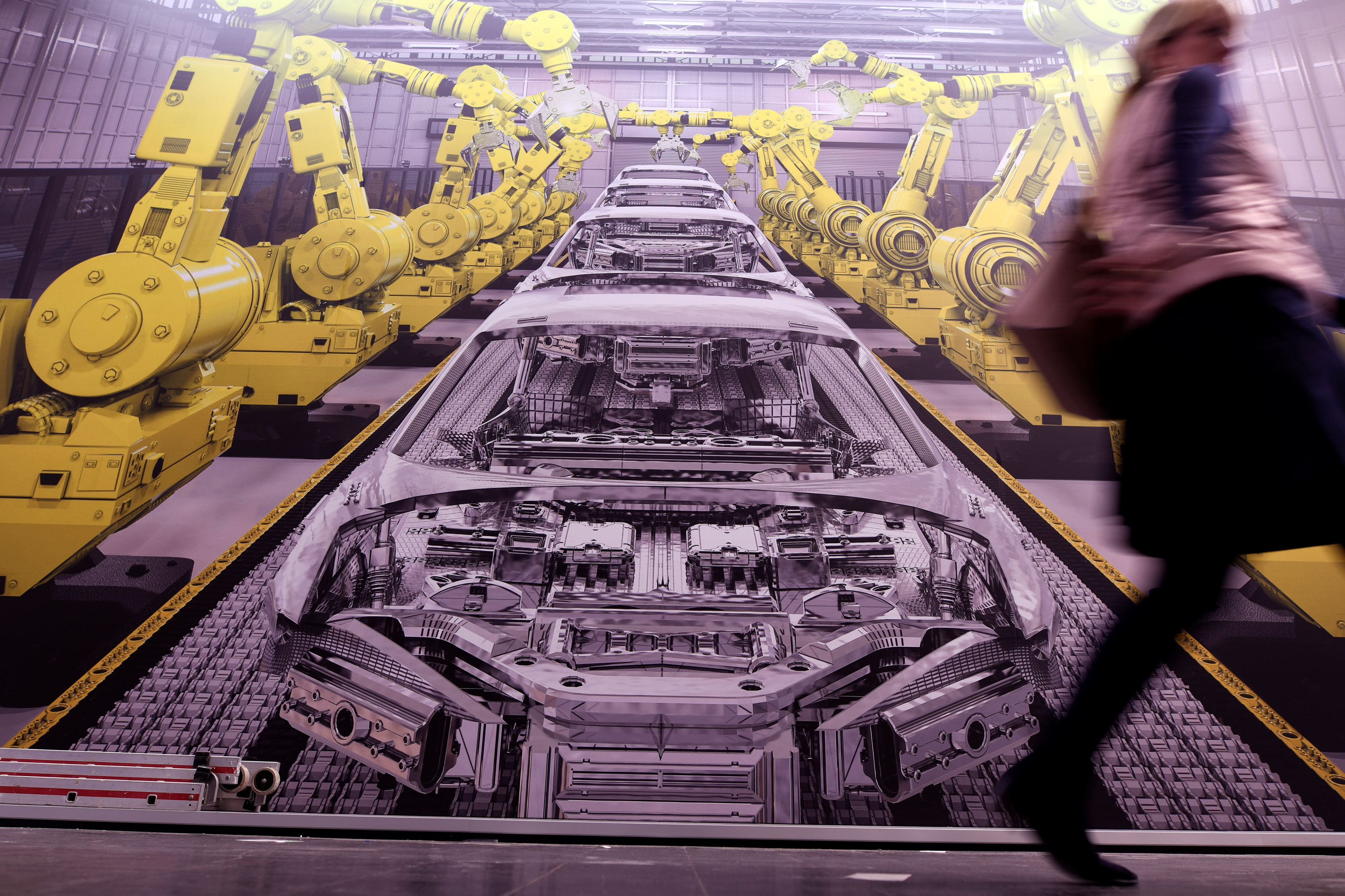
A woman passes a poster showing a production line with robots at the Hanover trade fair, in Hanover, Germany March 31, 2019. REUTERS/Fabian Bimmer
BERLIN, Aug 8 (Reuters) - Germany would face costs almost six times as high as Brexit if it and the European Union were to shut China out of their economies, the Ifo institute said on Monday, citing the results of a study.The biggest losers of a trade war with China would be the automotive industry with a 8.47% loss of value-added, manufacturers of transport equipment with a 5.14% loss and mechanical engineering with a 4.34% loss, the Ifo said.
The authors of the study, commissioned by the vbw industry association, said companies should pivot towards other countries to reduce dependency on certain markets and authoritarian regimes.
The goal of German and EU economic policy should be "to establish strategic partnerships and free trade agreements with like-minded nations such as the U.S.," co-author Florian Dorn said.
The analysis simulated five scenarios, including a decoupling of Western economies from China combined with a trade agreement between the EU and the United States.
While such an agreement could cushion the effects of a trade war with China, it would not offset them entirely. Rather, it would result in the net costs of a trade war equalling roughly the expected costs of Brexit, Ifo said.

